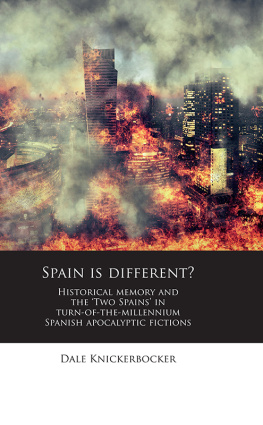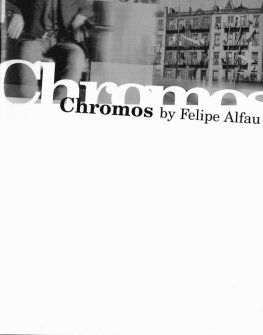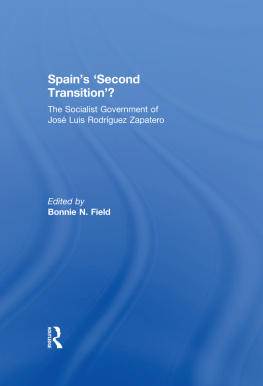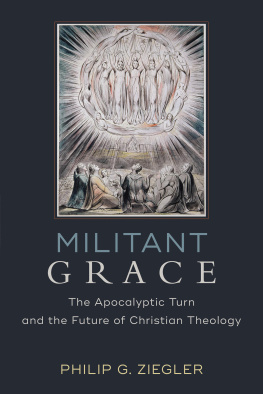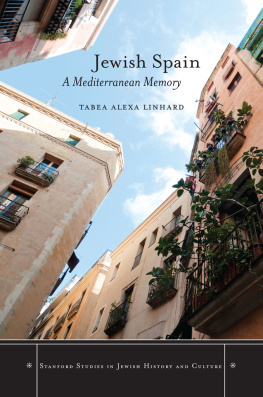Contents
IBERIAN AND LATIN AMERICAN STUDIES
Spain is different?
Series Editors
Professor David George (Swansea University)
Professor Paul Garner (University of Leeds)
Editorial Board
Samuel Amago (University of Virginia)
Roger Bartra (Universidad Autnoma de Mxico)
Paul Castro (University of Glasgow)
Richard Cleminson (University of Leeds)
Catherine Davies (University of London)
Luisa-Elena Delgado (University of Illinois)
Maria Delgado (Central School of Speech and Drama, London)
Will Fowler (University of St Andrews)
David Gies (University of Virginia)
Gareth Walters (Swansea University)
Duncan Wheeler (University of Leeds)
Other titles in the series
Blood, Land and Power: The Rise and Fall of the Spanish Nobility and Lineages in the Early Modern Period
Manuel Perez-Garcia
Fantastic Short Stories by Women Authors from Spain and Latin America: A Critical Anthology
Patricia Graca and Teresa Lpez-Pellisa
Carmen Martn Gaite: Poetics, Visual Elements and Space
Ester Bautista Botello
The Spanish Anarchists of Northern Australia: Revolution in the Sugar Cane Fields
Robert Mason
Paulo Emilio Salles Gomes: On Brazil and Global Cinema
Maite Conde and Stephanie Dennison
The Tlatelolco Massacre, Mexico 1968, and the Emotional Triangle of Anger, Grief and Shame: iscourses of Truth(s)
Victoria Carpenter
The Darkening Nation: Race, Neoliberalism and Crisis in Argentina
Ignacio Aguil
IBERIAN AND LATIN AMERICAN STUDIES
Spain is different?
Historical memory and the Two Spains in turn-of-the-millennium Spanish apocalyptic fictions
DALE KNICKERBOCKER

Dale Knickerbocker, 2021
All rights reserved. No part of this book may be reproduced in any material form (including photocopying or storing it in any medium by electronic means and whether or not transiently or incidentally to some other use of this publication) without the written permission of the copyright owner. Applications for the copyright owners written permission to reproduce any part of this publication should be addressed to the University of Wales Press, University of Wales Registry, King Edward VII Avenue, Cardiff CF10 3NS.
www.uwp.co.uk
British Library CIP
A catalogue record for this book is available from the British Library.
ISBN 978-1-78683-812-4
e-ISBN 978-1-78683-814-8
The right of Dale Knickerbocker to be identified as author of this work has been asserted in accordance with sections 77 and 79 of the Copyright, Designs and Patents Act 1988.
To my parents, Lorraine C. Knickerbocker and Harold W. Bud Knickerbocker
Over recent decades the traditional languages and literatures model in Spanish departments in universities in the United Kingdom has been superseded by a contextual, interdisciplinary and area studies approach to the study of the culture, history, society and politics of the Hispanic and Lusophone worlds categories that extend far beyond the confines of the Iberian Peninsula, not only in Latin America but also to Spanish-speaking and Lusophone Africa.
In response to these dynamic trends in research priorities and curriculum development, this series is designed to present both disciplinary and interdisciplinary research within the general field of Iberian and Latin American Studies, particularly studies that explore all aspects of Cultural Production (inter alia literature, film, music, dance, sport) in Spanish, Portuguese, Basque, Catalan, Galician and indigenous languages of Latin America. The series also aims to publish research in the History and Politics of the Hispanic and Lusophone worlds, at the level of both the region and the nation-state, as well as on Cultural Studies that explore the shifting terrains of gender, sexual, racial and postcolonial identities in those same regions.
I would like to thank Linda E. McMahon for her generosity in endowing the Department of Foreign Language and Literatures at East Carolina University with a Distinguished Professorship, the funds from which allowed me to finish this study. I also owe a great debt to my mentors at every level: Ellen Caricofe, Sonia Bispaniero de Edwards, Dr Diane Urey, Dr Lou Charnon-Deutsch and Dr Nancy Mayberry. The members of the International Association for the Fantastic in the Arts have left their intellectual fingerprints all over this study, and I thank them for their ideas, support and friendship.
The most important acknowledgement goes out to Purificacin Martnez Escamilla, who has honoured me with her love and companionship for more than thirty years, and who inspires me daily to be a better human.
_________________________________
To tell stories is to introduce order into the chaos of the world, to give to lifes events a meaning lacking in their mere happening. From this comes my certainty in the transcendent and originary nature of narration for the human species, in narration and the human condition being inseparable, in fiction being the first form of intelligence, a form of knowledge previous to all the rest.
As an undercurrent of Western imagination, apocalypticism is always with us.
This is a book about stories told by Spaniards. Some of these stories are classified, by the people who classify such things, as histories, narratives that explain events in the past as a series of causes and effects in an attempt to reveal some truth. Others are what we commonly call fictions, the product of human imagination (it is interesting that in Spanish the same word, historia, is used to refer to both). Robert Scholes has affirmed that our species possesses a psychological need for narration, serving to help us to make sense of our environment.
Historically, the first of such narratives were most likely mythological or religious. These writings have always constituted an important explanatory tool for cultures, as well as means of expressing collective identity, and are thus among the best primary sources for investigating the mind of homo sapiens. It comes as no surprise, then, that writers of fiction have mined and adapted these narratives.
One of the most common stories of this type describes the destruction and recreation of the world what we now call apocalypse and anthropologists have amply demonstrated the existence of such tales in a vast number of cultures, locations and time periods. This study will attempt to explain what social reality is being processed emotionally and intellectually in these fictions, and how.
This study was inspired by a few simple observations: first, that fictional representations of apocalypse seemed to be everywhere around the turn of the millennium. Apocalyptic themes in books, films, video games, comics and other media were and continue to be so omnipresent as to make Saul Friedlnders 1984 observation cited above seem a platitude. A keyword search of the WorldCat database of publications, film and music gives 2,304 hits for apocalypse and 2,055 for apocalyptic between 1970 and 1990. These numbers increase to 12,828 and 8,504 respectively between 1990 and 2005, the time period covered in this study. A search for the Spanish-language equivalents yields proportionally similar results: 549 and 66 to 1,440 and 352. A subject search of the MLA Bibliography yields no fewer than 1,212 items containing some form of the word

